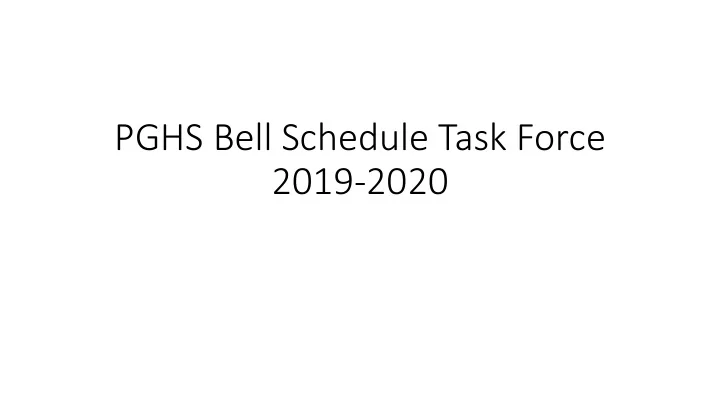

PGHS Bell Schedule Task Force 2019-2020
Who/ What/ When • Change team: • 6 teachers, 2 counselors, 1 admin • Given 3 hours of adjunct duty. • Met Thursdays at lunch (Aug-Feb). • Agreed on vision and made plan of action. August
“Action Pedagogy” Process : : 1.) Survey staff on what site issues they perceive with current bell schedule. 2.) Tackle issues one at a time, and vote on resolutions about new bell schedule. 3.) Check in with admin about proposed changes. 4.) Use the (surviving) resolutions to guide us in creating a new bell schedule . 5.) Vote on it as a staff 6.) Present to admin for approval. 7.) Present to board for approval. 8.) Evaluate after a year to see if changes made have had a positive impact.
Staff Survey Results: Four issues the staff felt strongly about. 1. Later start time to promote healthier sleep schedules. 2. Reduced length of block periods 3. Intervention services and offerings 4. Staff collaboration meeting time September
Proposed Solutions Results • Shorten blocks to 90 minutes. 74.2% • Start later in the day. 64.5% • Create new intervention 73.3% opportunities and develop organizational capacity for future programs. • Change collaboration to fit inside 80.6% the normal working day. October
Making the Bell Schedule • Ultimately had eight different potential iterations that incorporated the four solutions to varying degrees of success. • Lots of unique restrictions and challenges were discovered through SWOT analysis and discussion. • How do we shorten blocks without crippling CTE, Science, or PE classes? • School periods could not be less than 50 minutes for dual enrollment periods • How do we preserve the 0.6 FTE, 3 days a week, option? November
Second Survey for Clarity • An additional survey was needed to clarify what “intervention” meant to the staff. • The staff overwhelming did not want to lose instructional minutes for intervention minutes. • Targeted intervention (rather than school-wide intervention) was decided on and implemented for next school year. January
And then there was one… • The sole remaining bell schedule that withstood critical analysis by the Bell Schedule Task Force was Lab/Non-lab. • At the February staff meeting, the staff voted 67% in favor of the Lab/Non-lab Schedule! February
Lab/ Non-lab (Overview) • The Lab/Non-lab Schedule has teachers assign their courses the designation as either a Lab or Non-lab class. • Lab classes meet 3 times a week: two blocks and one short period. • Non-lab classes meet 4 times a week: one block and three short periods. • Lab classes and non-lab classes happen simultaneously. • The weekly instructional minutes of courses stay the same (250).
Management • The Bell Schedule Task Force handed the final product off to site administrators to take to the Management Team Meeting. • Several issues (master schedule, transportation, food services) have been identified are in the process of being remedied.
Take Away • Successful teacher-led change process using Action Pedagogy model. • Many of the issues addressed by the new bell schedule will support struggling students. • TWO-THIRDS of the staff are in favor of the new schedule.
Recommend
More recommend